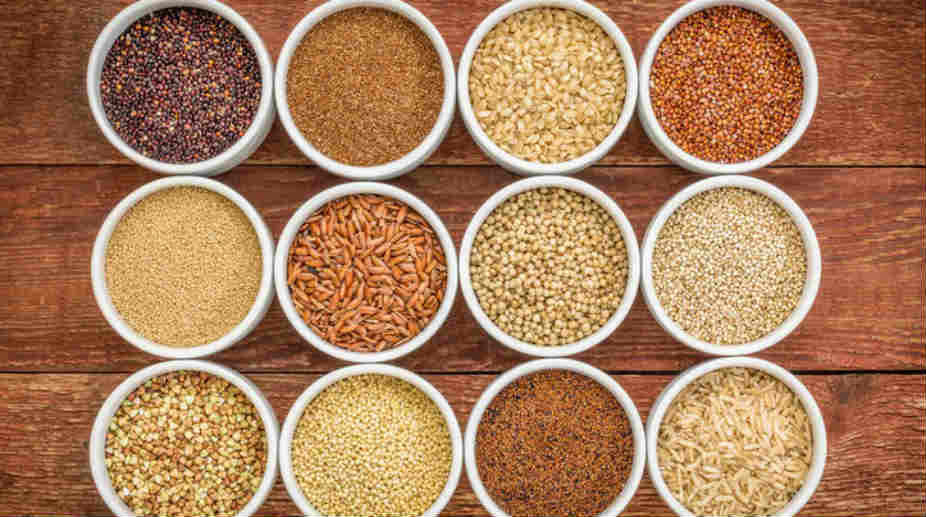Grains are the primary staple food of India. Grains are a nutritionally rich product and deliver recommended nutrients to the body. Consumption of grains in different civilizations of India can be observed from the literature. In Indian history we can discover distinctive grains used by our ancestors. Beginning with Yajurveda, the three pulses urad (Vigna mungo), mung (Vigna radiata), and masoor (Lens culinary) were the most commonly used grain legumes.
All grains have good calorific value, largely from starch and proteins. Some of the grains exhibit antinutritional properties such as the presence of trypsin inhibitors . Traditional processing techniques such as fermentation, soaking, and cooking help to remove these antinutritional factors . In view of health, resistant starch received attention because of its potential health benefits and functional properties. Many traditional Indian grain products may contain higher amounts of resistant starches because of higher proportions of whole grain ingredients and less intensive processing . Some of the traditional grain-based health foods with their functional and health benefits are discussed below.
1. Idli
Idli is a fermented product prepared from rice and black gram batter by steam cooking . Idli is a white colored, small, round, and spongy product .In 1485 and 1600 CE, idli was compared to the moon, which suggests that rice was in use. Use of rice along with pulses is necessary as a source of mixed natural microflora needed for efficient fermentation. Idli is suggested in all seasons and is used as a breakfast food. It adds a good amount of protein to the daily diet. Due to the fermentation process, idli is more digestible and is recommended to all age groups.
2. Dosa
Dosa is another fermented dish like idli mainly found in the south Indian region. It is a highly seasoned pancake, containing rice and black gram as primary ingredients. To improve the nutritional quality of dosa, finger millet and horse gram can be used as primary ingredients Dosa is a breakfast food in south India. It is more digestible and nutritionally dense, and hence is recommended to elderly people and children younger than 10 years. It is consumed with palya or curry in all seasons.
3. Ambali
Ambali is a finger millet-based fermented semi-liquid product of south Indian states, Karnataka and Tamil Nadu. Preparation method includes mixing of finger millet flour with water to make a thick batter and followed by cooking and fermentation. Ambaliis consumed as such, or with buttermilk for taste. Consumption of ambali in winter and rainy season should be avoided because it is very cold (endothermic) in nature. It consists of sufficient amounts of calcium and is a healthy drink for elderly people.
4. Ragi hurihittu
Ragi hurihittu is the flour of popped finger millet, rich in dietary fibers and nutrients. Popping is a simple processing technique done by severe heat treatment. It improves the aroma and taste and decreases antinutritional factors and increases the digestibility and solubility of starch because of gelatinization .
5. Enduri pitha
Enduri pitha is a flavoured cake, native to Odisha state, prepared during the prathamastami festival. It is prepared by steaming the fermented batter of parboiled rice and black gram in a turmeric leaf and folding the leaf through the mid-vain . The batter-filled folded leaves are then cooked over steam. Black gram proteins are deficient in methionine and cysteine amino acid, this lowers the biological value of proteins and fermentation seems to enhance the nutritional quality of the blend of black gram and rice . Other ingredients such as coconut, curd, and sugars are added. It is recommended to all age groups. The extracts of turmeric leaves through this traditional food in the winter season increase the immune system of the body .
6. Dhokla
Dhokla is indigenous probiotic breakfast food found mainly in Gujarat state. Dhokla is prepared from the fermentation of Bengal gram and rice. The method of preparation is the same as idli, but it is steamed openly rather than covered as is done in idli preparation dhokla can be a good food item in the diet menu of diabetic patients.
7. Hawaijar
Hawaijar is an alkaline-fermented soybean product consumed daily as a source of protein in Manipur. It is unsalted and has a characteristic flavor and stickiness . Since hawaijar is rich in proteins, it is recommended for adults and children older than 10 years.
8. Selroti
Selroti is a rice-based fermented food, which is spongy and ring shaped . It is consumed in Sikkim and Darjeeling. A local variety of rice is used for its preparation. Rice or rice flour is soaked overnight in cold water and then water is decanted. Soaked rice is pounded into small powder using wooden mortar and pestle. Then the rice is mixed with wheat flour, sugar, butter, and condiments such as cloves, cardamom, coconut, nutmeg and cinnamon. Milk or water is used for kneading the powder into soft dough for easy flow.
A balanced diet in terms of calories, proteins, fats, carbohydrates, minerals, electrolytes and vitamins is essential for a healthy life. A proper diet provides the daily requirement of nutrients to the body, thus enhancing the immunity of the person.
The dietetics Department at D.S.Research Centre strives to establish and encourage good nutrition practice and provide good nutrition care to the patients and normal individuals.








Posted on April 15, 2016
Posted on April 15, 2016